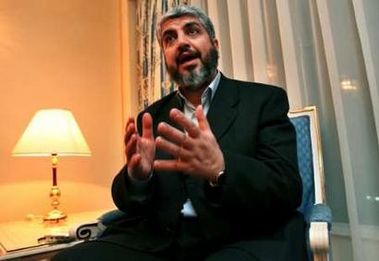Hamas leader-in-exile Khaled Meshaal said on Wednesday the Palestinian
militant group will continue to fight Israel and told the United States that its
Middle East policy would fuel terrorism.

Hamas leader-in-exile Khaled Meshaal talks
during an interview with Reuters in Abu Dhabi March 22, 2006. Meshaal said
on Wednesday the Palestinian militant group will continue to fight Israel
and told the United States that its Middle East policy would fuel
terrorism. [Reuters] |
"Israel cannot have stability with occupation. It has to choose. This is the
message Israel should understand," he told Reuters in an interview in Abu Dhabi.
"Armed resistance is legitimate. All resistance options are open to the
Palestinian people and Palestinian factions including Hamas," said Meshaal, who
is touring Arab and Muslim countries to solicit financial and political support.
He said that he informed Arab leaders that the government his group will head
needs $1.75 billion per year to make ends meet and that he was confident that
they would help.
Israel says it will not negotiate with a government led by Hamas, which is
sworn to destroy the Jewish state and has carried out nearly 60 suicide bombings
against Israelis since a Palestinian uprising erupted in 2000.
Since its victory in Palestinian elections in January, Hamas has been under
pressure from the United States, the European Union and Israel to give up
violence and recognize Israel or lose crucial financial aid to the Palestinian
Authority.
"So long as there is an Israeli occupation in Palestine and so long as U.S.
policy is biased, the so-called terrorism that the United States fears will
escalate because the mistakes of U.S. foreign policy are pouring oil on fire,"
Meshaal said.
He said his message to U.S. President George W. Bush was "that he should not
worsen his mistakes."
Meshaal said Middle East peace required Washington to adopt an "even-handed
policy that maintains the same distance from all sides" involved in the
conflict.
He said Hamas would reject international pressure to recognize Israel until
Israel was compelled to change its position on Palestinian rights.
"It is illogical for the victim to be pressed to recognize its murderer and
occupier," Meshaal said. "What is required is a fundamental change in the
Israeli position."